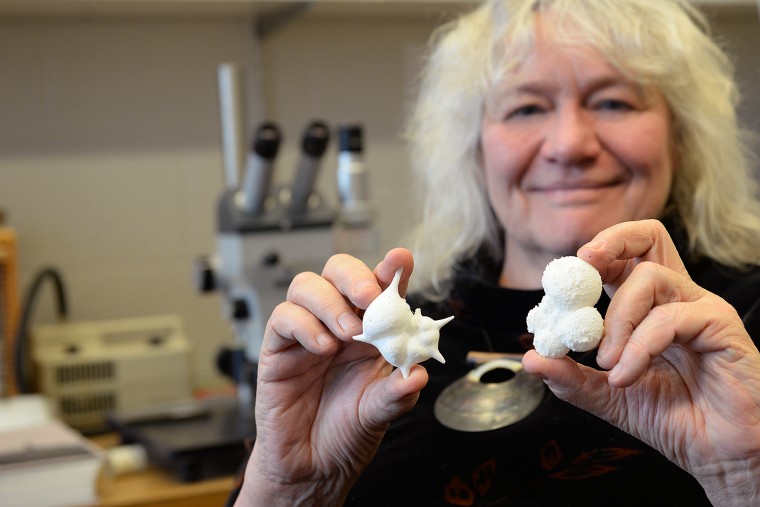The availability of sufficient dissolved oxygen in seawater is critical for marine life, and places where oxygen falls below a critical concentration — or "dead zones" — are often associated with mass die-offs of fish, shrimp and other creatures. With future global warming, the oceans are on course to see progressively less dissolved oxygen available. Scientists currently use often not well-tested computer models to predict the expansion of dead zones, but a team of researchers from Wesleyan, University California Riverside and Syracuse University are hoping to use oceanic sediment samples to better predict where die-offs may occur next. Their study,…
(more…)
Amid rising student interest, Wesleyan has announced a new interdisciplinary minor in Integrated Design, Engineering, and Applied Sciences (IDEAS), beginning in 2017-18. It will be hosted within the College of Integrative Sciences (CIS). The IDEAS minor will introduce foundational skills in engineering and design, and bring together existing arts, design, and applied science courses to create a more formal structure to guide students interested in these fields. According to Professor of Physics Francis Starr, a co-proposer of the minor and director of the CIS, “The new minor plays into Wesleyan’s unique capabilities and dovetails with Wesleyan’s commitment to prepare students…
New climate research by Dana Royer, professor and chair of earth and environmental sciences, finds that current carbon dioxide levels are unprecedented in human history and, if they continue on this trajectory "the atmosphere could reach a state unseen in 50 million years" by mid-century, according to an article in Salon. The carbon dioxide levels in the atmosphere today are ones that likely haven’t been reached in 3 million years. But if human activities keep committing carbon dioxide to the atmosphere at current rates, scientists will have to look a lot deeper into the past for a similar period. The…
Chris Weaver MALS ’75, CAS ’76, visiting professor in the College of Integrative Sciences at Wesleyan, was appointed co-director of the Video Game Pioneers Archive at the Smithsonian Institute’s Lemelson Center for the Study of Invention and Innovation. This one-of-a-kind initiative will record oral-history interviews with first-generation inventors of the video game industry, creating a multimedia archive that will preserve the evolution of the industry in the words of its founders. The archive will offer scholars and the public the opportunity to better understand the personalities, technologies, and social forces that have driven interactive media to become one of the…
Ellen Thomas, professor of earth and environmental sciences and University Professor in the College of Integrative Sciences, recently co-authored five papers in academic journals. Her first paper, “Jianshuiite in Oceanic Manganese Nodules” co-authored with Jeffery Post and Peter Heaney, appeared within American Mineralogist. Deviating from her usual research, Thomas focused on mineralogy and, in particular, the crystal structure of a rare mineral found in sediments during an ancient counterpart of future global warming. Thomas co-authored “Variability in Climate and Productivity during the Paleocene-Eocene Thermal Maximum in the Western Tethys,” with Flavia Boscolo-Galazzo and Luca Giusberti, both of the University of Padova.…
Lisa Dierker, professor of psychology, director of pilot programs for the Center for Pedagogical Innovation, and Ishita Mukerji, the Fisk Professor of Natural Science, professor of molecular biology and biochemistry, professor of integrative sciences, were both honored at the 12th annual Women of Innovation Awards. Presented by the Connecticut Technology Council, the awards celebrate the energy, creativity and success of women and students from Connecticut's science and technology community. Both professors were honored in the category of Academic Innovation and Leadership. The celebration was held April 6 in Plantsville, Conn. Dierker was honored for her work developing a curriculum to introduce students to…
Assistant Professor of Psychology Psyche Loui has long been interested in studying the intersection of music and emotions. In her latest study, published March 10 in Social, Cognitive, and Affective Neuroscience, she identified specific connections in the brain between the auditory processing regions and regions for social and emotional processing. The article is titled, "Brain connectivity reflects human aesthetic responses to music." Loui, who also is assistant professor of neuroscience and behavior, assistant professor of integrative sciences, has previously studied how music can cause chills, or similar strong physiological reactions in people when listening to music. Together with former thesis student…
Wesleyan is one of only 12 institutions awarded a prestigious Beckman Scholars Program this year, according to Francis Starr, director of the College of Integrative Sciences and professor of physics, who directs Wesleyan’s Beckman program. The Beckman Scholars Program provides intensive research experiences and career mentoring to help Wesleyan undergraduates develop as leaders in the sciences. Up to two Wesleyan students will receive this award annually, which carries a total stipend of $18,200 plus funds to support supplies and travel. Awards are normally made to sophomores to support research during the summer through the summer following junior year. (more…)
Associate Professor Barbara Juhasz, Akila Raoul '16 and Micaela Kaye '16 visited the Green Street Teaching and Learning Center Dec. 2 to lead a workshop on word recognition. Juhasz is associate professor of psychology, associate professor of integrative sciences and associate professor of neuroscience and behavior. The trio worked with students enrolled in Green Street's AfterSchool program. During this special half day program, Juhasz spoke to the Green Street students (in grades 1-5) about her word recgonition research at Wesleyan and then lead a hands-on workshop involving word games. "Our students had a wonderful time exploring the concept of compound…
Psyche Loui, assistant professor of psychology, assistant professor of neuroscience and behavior, assistant professor of integrated sciences, is the co-author of a new study, "Rhythmic Effects of Syntax Processing in Music and Language" published in Frontiers in Psychology in November. The article's lead author is Harim Jung '16, and it is also co-authored by Samuel Sontag '14 and YeBin "Shiny" Park '15. According to Loui, the paper grew out of her Advanced Research Methods in Auditory Cognitive Neuroscience course, and is the precursor to Jung's senior and master's theses. The study uses a behavioral test to look into how music…
Ellen Thomas, the University Professor in the College of Integrative Sciences, research professor of earth and environmental science, is the co-author of two recently published papers. They include: "Microfossil evidence for trophic changes during the Eocene–Oligocene transition in the South Atlantic (ODP Site 1263, Walvis Ridge)," published in Climate of the Past, Volume 11, pages 1249–1270 in September 2015 and "Changes in benthic ecosystems and ocean circulation in the Southeast Atlantic across Eocene Thermal Maximum 2," published in the journal Paleoceanography, Volume 30, pages 1059-1077 in August 2015. "Microfossil evidence" describes changes in organisms living in the oceans during a major change in the…








